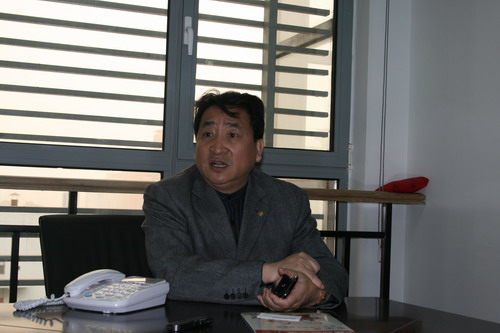 |
|
Jiang Kun,Party Secretary and Vice President of the Chinese Quyi Artists Association (CQAA)
|
Finally we met with Jiang Kun! This time he did not serve as a cross talk actor, but as Party Secretary and Vice President of the Chinese Quyi Artists Association (CQAA).
In recent years, Jiang Kun has significantly performed less on stage as he has focused his efforts on fighting for the rights of Chinese Quyi artists (referring to such traditional Chinese folk art forms including the singing of ballads, story telling, comic dialogues, clapper talks and cross talks). Over the past two years, Jiang Kun has vigorously promoted rights protection for Quyi on various occasions, in the triple capacity of a famous cross talk performer, a leader of the CQAA, and a member of the CPPCC National Committee, and his remarks and articles frequently are quoted in the press on strengthening copyright protection for Quyi.
Quyi protection is urgent
Quyi works are very popular with the Chinese masses due to their lively styles and well-loved artistic features. Often used in large quantity, they are repeated regularly on radio, television, Internet, digital communications, audios, books, movies, railways, highways, civil aviation, and in other forms of media and carriers.
“Quyi works, such as cross talks, have enjoyed high ratings in a variety of media formats for a long time because they are most popular and highly regional. Many types of media make full use of Quyi works for broadcast to attract public attention and continually raise ratings with the goal of increasing their advertising and sponsorship proceeds, and achieving their business values”, Jiang Kun told our Journalist.
In the meanwhile, acts of infringement of Quyi are seen repeatedly as users gain interest, directly or indirectly, through extensive use and adaptation of Quyi works. However, right holders cannot receive compensation. It is essentially a full-range and large-scale infringement. This not only infringes directly upon legitimate rights and interests of copyright holders, but also has serious effects on the whole Quyi community and development of Quyi arts in a sound and orderly manner. Some Quyi artists could not help but sigh: “When it comes to creation and protection in the Quyi community, comedians will not laugh at all.”
When talking about the severity of infringement regarding Quyi works, Jiang Kun said, “In our country, copyright protection of Quyi works has always been frail., Quyi works are used in a variety of streaming media at will, basically without any proper protection. Besides, 60% of audio and video products of Quyi are piracy and 40% are infringement. Among the 40%, only 1% was likely to have been licensed sometime in the past.”
“The most prominent is flash works, making use of our voices, our images, our works, our creativity, while Quyi authors and actors providing original copies and voices don’t obtain reasonable compensation, they haven’t even received any application for licensing from individual or unit users of their works. This is very abnormal.”Jiang Kun said.
Selected “2009 Man of the Chinese Copyright Industry” at the "2009 China Copyright Annual Conference" in November, Jiang Kun delivered a keynote speech as a representative of the award-winners. In his remarks, he stated, "Today I am here not in the capacity of an award winner, but as a victim." He pointed out that Quyi was one of the "worst-hit disaster areas" of infringement, and that he himself was a “victim.”
Various reasons behind inadequate protection
Jiang Kun held the view that currently copyright protection of Quyi features a high volume of uses in various forms and rampant acts of infringement. Compared to other kinds of arts, Quyi’s copyright protection has a very weak and sparse voice in society. The reasons are mainly as follows:
First, Quyi workers and users do not have a strong sense of copyright protection, and acts of infringement, either intentional or unintentional, are common. Quyi works, particularly cross talks, monologues and other comedic forms are greatly different from other art forms in the fact that their intellectual achievements are exclusive and cannot be reproduced. Additionally, because the public does not have a strong sense of copyright, some users, in their use of these works to reap benefits, ignore the rights of rights holders, leading to frequent unconscious acts of infringement.

